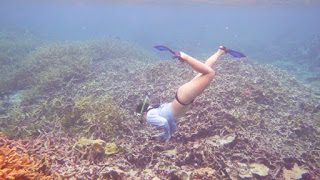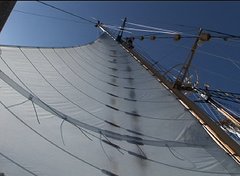Sometime after midnight, bioluminescence comes into full bloom. Flecks of dinoflagellate-produced light flicker on the inky waves, disappearing as quickly as they appear, like a magic trick, a wink, a blink of a great oceanic eye. During my last dawn watch, I paused for a moment as force 4 winds blew in from the southeast, sending whispers of stratocumulus clouds across the sky. A set of steep stairs took me down into the red-lit charthouse, and I braced my legs against the rolling ship, the handrails I helped re-tighten with the engineers two weeks ago still solid under my grip.
It’s strange how accustomed we’ve all become to this ship, to this place that is both voyage and home, how quickly we’re getting used to six-hour watches separated by twelve hours of sleeping, eating, and whatever else we can fit in. Nothing stays still on this ship. Things spill, tip, and fall over all the time. Bodies collide, sometimes with metal or wood, oftentimes with each other.
Our days are marked by the time we wake and the time we go to sleep. Sometimes we close our eyes and sink into our bunks when the sun is just rising and wake up at a different latitude, rain pouring down on the quarterdeck. Another ITCZ squall. We eat our meals on gimbaled tables and seem to know—most of the time—where to put our elbows, a plate, a bowl of sloshing soup. There are days when we forget where we are and it’s okay. We learn to patch up our wounds, let our bruises heal, clean up our messes with multicolored microfiber towels from the closet.
Crossing the Pacific, the ocean becomes a sound, a smell, a swell, a memory, a curse, a tease, a song, a burning blue. It calls upon a system of inhuman time, cycles of unknowable depths and immeasurable wonders, a pelagic mystery, an alien universe. Over these past three weeks, the ocean has constituted, at least for me, both journey and destination, beginning and closing, new and old patterns of who I thought I was and am, all coursing over the pour of liquid distances.
The philosopher Søren Kierkegaard once wrote that “Life can only be understood backwards, but it must be lived forwards.” Whether or not Kierkegaard ever spent much time on a tall ship like the Robert C Seamans, I’ve been coming back to this quote as I realize how hard—and perhaps impossible—it is to reflect on an experience as it’s happening. Instead, what we end up understanding about a time or experience becomes understood afterwards, when connections coalesce from scattered dots of observation and patterns of perception become a line, a circle, a spiral, a shape. Certain moments, interactions, and encounters take a form and color as intense and inconstant as the shifting sea.
So what can one say?
I suppose I could talk about the first time I dove into the coral reefs at Palmyra Atoll with my lovely friend and research partner Jessie.
Beneath the teal tropical waters, we swam through a world composed of streaks of motion—triggerfish, tangs, blennies, sharks, mantas, and parrotfish chomping on the corals. Jessie and I deployed three hydrophones across the coral reefs at Palmyra for our bioacoustics project, recording over one-hundred and fifty-six hours of sounds. Camille, our TA and project mentor, nearly wept as we huddled around her laptop the next evening and passed the headphones around, listening to a chorus of crepuscular fish calling into the coral midnight.
I suppose I could also talk about how I’ve come to love the glow of a sunrise over open ocean. Or how, during the few hours before twilight, breaking waves sound like soft breaths punctuating the quiet night. Of course, among these moments of beauty are the more difficult ones, too, like finding a way to make peace with stubborn layers of sea and sweat on the skin, a persistent queasiness in the stomach, a dull longing for loved ones on land. We take so much for granted that only when some things are stripped away do we see how much they mean to us.
A year ago, I was working as a wooden boatbuilding apprentice in midcoast Maine. I wore brown Carhartt overalls which became stained with varnish and emerald marine paint. Despite hundreds of hours of working with boards of pine and cedar, chiseling and restoring various sailboats, canoes, and dinghies, I never got to see what ultimately became of them, where they ended up going, what they saw, whose lives they intercepted.
I certainly never imagined that I would be where I am today, writing to you from a tall ship in the central Pacific Ocean. Did the makers of the RCS think about all the students it would carry, all the places it would go? What kinds of understanding it would bring forth?
The first time I climbed aloft onto the mainmast, I found myself high above the birds circling around the ship. I paused as I made my way to the top, looking down on everyone below me moving between watches, between tasks, between moments. Everyone on this ship, from the captain to steward to engineers to mates to scientists to students, contributes in their own way to this voyage and experience. We are each and all part of something greater than ourselves, moving forward, moving with the rhythm of the sea.
In his night orders to the evening and dawn watches, captain Greg writes a message with instructions for the night, reminding us always to remain vigilant and alert. Being vigilant and alert are critical to maintaining the safety of the ship, and to these, I would also add remaining patient, brave, and above all, kind.
Our voyage
is mostly behind us, but there are still a few more precious, difficult days
ahead of us as we sail back to Honolulu. If life can only be understood
backwards, then it must be lived forwards, just as our ship propels itself forwards
in accordance with the winds and weather, invoking forces much more powerful
than our individual selves.
-Regina Kong







No comments:
Post a Comment